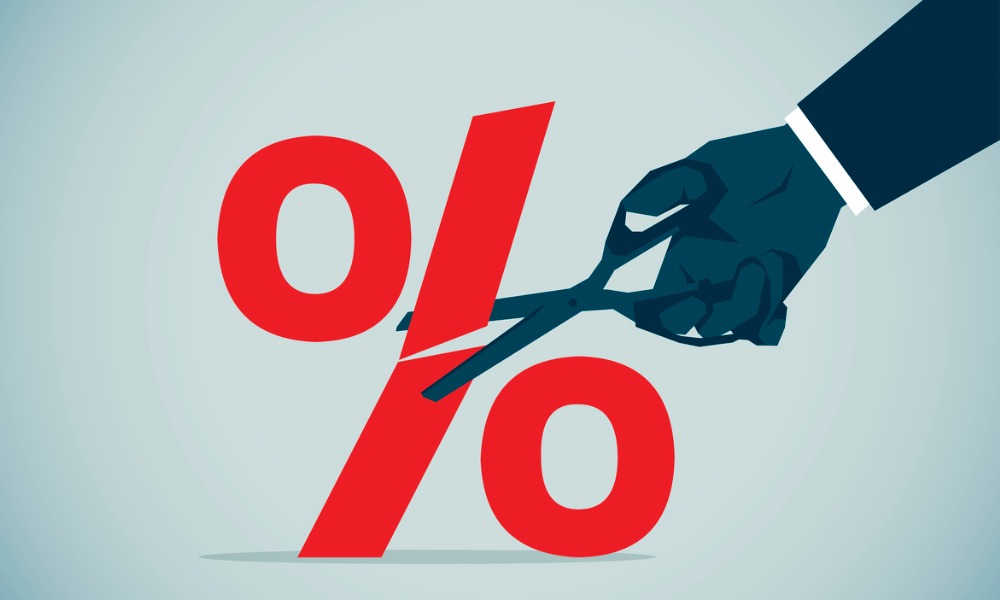There's little immediate prospect of a cut – but could an economic downturn change that?

Bank of Canada interest rate cuts before the end of 2023 were mooted as a real possibility at the onset of US financial system chaos in March – and while that prospect has receded in the eyes of many economists, much attention remains focused on when the central bank will finally start lowering rates.
As ever, inflation remains the strongest factor influencing the Bank’s approach to its benchmark rate. The consumer price index (CPI) ticked down significantly in May to hit its lowest level for nearly two years, although elevated core inflation metrics are likely to see central bank decisionmakers maintain a stern approach to interest rates.
Unless GDP figures and the Bank’s business outlook survey for the second quarter of the year reveal a larger-than-expected economic cooldown, RBC economist Claire Fan said she “continue[s] to expect the Bank to hike the overnight rate by another 25 basis points in July, before stepping back [to] the sideline for the rest of this year.”
TD is also anticipating a further hike in July, with deputy chief economist Derek Burleton telling BNN Bloomberg this week that a 25-basis-point jump is in the cards – with rates only likely to start falling by the second quarter of next year in a “gradual step-down.”
CIBC, meanwhile, forecast in the wake of the central bank’s June rate increase that another hike is likely to arrive in July or September, bringing its trendsetting interest rate to 5.0%.
Still, the collapse of Silicon Valley Bank and Signature Bank south of the border earlier this year sparked speculation that a 2023 rate cut would take place in Canada – and the possibility of another surprising economic development, can’t be ruled out, according to a Toronto-based mortgage agent.
Ryan Sims of TMG The Mortgage Group told Canadian Mortgage Professional that he believed the emergence of worrying economic data – for instance, indicators of a prolonged and nasty recession – could compel the Bank into deciding to lower interest rates before the end of the year.
“I think there will be an existential shock to the economy here in the fall and I believe it necessitates the Bank of Canada cutting rates,” he said. “I’ve been pretty steadfast in my belief that the back half of this year, specifically getting into September, October, I think there’s going to be a gong show. I think we’re due for something.”
Canada’s #householddebt is now the highest in the G7 – and amidst economic headwinds and rapidly rising #interestrates, some observers have sounded concern about the fragility of the national housing and mortgage markets in recent weeks.https://t.co/IlEvlnMkVm#mortgagenews
— Canadian Mortgage Professional Magazine (@CMPmagazine) June 26, 2023
What kind of recession could be on the way in Canada?
May saw the national unemployment rate increase for the first time in nine months, hitting 5.2% in a small jump over the previous month. The economy also shed 17,300 jobs, belying analyst expectations of a net gain of 23,200 jobs.
That provided an early indication that the economy could be softening after months of robustness marked by strong activity, persistent annual price growth and a resilient labour market.
RBC’s latest macroeconomic outlook suggested that a so-called “soft landing” – in which inflation returns to the Bank of Canada’s target rate without a significant economic slowdown – appeared unlikely. “Even near-term positive growth surprises will only delay, rather than prevent, a ‘bump’ landing,” the bank said.
Manulife Investment Management global chief economist Frances Donald, meanwhile, has said a sharp recession could be set to take effect by the third quarter of the year.
Could a recession be good for the Canadian economy?
Sims said that a protracted cooldown could be just what the doctor ordered for Canada’s housing market, which saw prices and activity skyrocket during the COVID-19 pandemic as buyers availed of access to cheap credit and pent-up savings.
“I would welcome higher rates and a slowdown in the real estate space,” he said. “I don’t know if we’ll get the full effect of that because the government tends to be cushioning a lot of these economic blows in the last while. Really ever since 2008, there’s been too much manipulation in the real estate space.
“So I would love it if the market would correct and you can actually get buyers to determine a price and buy a home. You’ve got a lot of people that can’t afford to buy homes.”
Make sure to get all the latest news to your inbox on Canada’s mortgage and housing markets by signing up for our free daily newsletter here.



